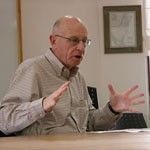By Ira Sharkansky
JERUSALEM — The cases of coronavirus continue to spike in Israel. By some professional predictions, we might reach 12,000 new cases sometime next week.

However, the incidence of seriously ill, hospitalized, and deaths may have peaked, and begun a downturn. Presumably due to the increasing incidence of people getting their booster shot. It’s now available to those 40 and over, and may soon be available to all those in the society.
But discipline is a problem.
There’s a low incidence of vaccinations among the Arabs, especially among the Bedouin, and among the ultra-Orthodox.
And Israelis continue to travel overseas. Including Bibi (former Prime Minister Benjamin Netanyahu), gone to the U.S. for a vacation.
All that despite Prime Minister Naftali Bennett’s call to stay within the country.
Those coming back are required to be in quarantine for a week. But the incidence of those violating this restriction is apparently high.
And there is plenty of mixing , beyond the restrictions, in family celebrations, at the shopping malls, movie houses, synagogues, and other places where people come, with their kids.
There are formal requirements for testing, but mixed signals of when the areas are open, long lines, and delays in getting results.
What about the opening of schools, currently scheduled for September 1?
Minister of Education Yifat Shasha-Biton insists they will open. She had also opposed vaccinating children in the schools, calling it “criminal.” But now there is an order from the Ministry of Health to vaccinate school children, in the schools, where they can be reached more or less easily. Permission by a parent will be required.
But there is discussion of postponing the opening of schools, presumably for a month.
September is a month of holy days, with schools — in the best of circumstances — open for perhaps nine days.
And mixing the kids in the schools will provoke more outbreaks.
Currently there are complex requirements of which classes will meet, and which will rely on zoom, depending on how many kids are found to be ill.
Plus requirements for parents to perform tests on their kids before they begin school. How many will do this? And how many will respect the results of the tests and keep infected kids away from others?
And what about more than 30,000 teachers in schools and nursery schools who have not been vaccinated?
All told, it’s a mess.
Bibi’s trip overseas is being widely criticized among his rivals in the Likud Party. So far no clear outbreak of rebellion. He’s still the party leader, but there are at least a half-dozen rivals waiting for the chance to replace him. But the prospect of an intra-party war is keeping the competition quiet, sort of.
The leader of Hezbollah has warned Israel not to interfere with an Iranian ship carrying oil to Lebanon. But what else is the ship carrying?
We’ll see how this plays out.
Meanwhile, Israeli attacks against Syria continue. Despite the warning from an Arab Knesset Member of Meretz about that party’s withdrawal from governmental support, along with that of the Arab party Ram, if there would be further Israeli attacks against an Arab site
The Middle East remains a complex muddle.
The American collapse in Afghanistan is worrying some that U.S. support for Israel may also crumble. But here there’s a major difference. Israel has not relied on American troops to defend it. U.S. aid and political support, yes. But the troops on the ground here, willing to fight and die, all speak Hebrew. They’re us, and our kids.
We can continue arguing about what the U.S. did in Afghanistan, and its failure to attract Afghans to fight for themselves. Like 40 years ago, the U.S. failed to enlist widespread support for its actions among the South Vietnamese.
It’s a long way from the U.S. to those trouble spots. Now Vietnam is no longer a U.S. trouble spot. Communism is something to live with, insofar as something like it, with its name, rules important countries.
Taliban? Muslim extremism? To live with? Israel? Lebanon? Syria?
Lots of questions, and few if any answers.
We’ll see.
Your comments are welcome.
*
Ira Sharkansky is professor emeritus of political science at Hebrew University. He may be contacted via ira.sharkansky@sdjewishworld.com